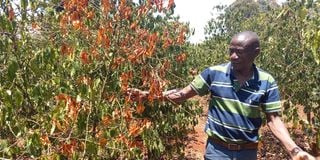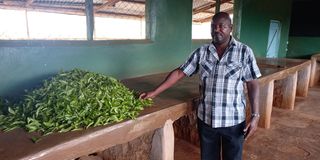Premium
How drought affected Nyeri tea and coffee growers

Mr Geofrey Mutahi at his farm in Kiganjo Nyeri County. His coffee plantation has started drying due to drought. This will affect the quality of coffee produced by the end of the year.
As farmers continue suffering from the pangs of drought in Nyeri, tea and coffee plants have started drying up affecting production rates in factories and the quality of the yields.
While tea farmers pick their produce from the farms from Monday to Saturday, some tea collection centres have registered a significant drop in the number of farmers delivering their produce.
At the Nyarugumu collection centre which has 87 members, only one farmer had managed to deliver at least five kilos of green leaf to the centre when the Nation.Africa visited. The collection was to be transported to Gathuthi tea factory in Tetu for processing.
The centre chairman Charles Patrick Maina said only four people have been delivering tea leaves, though not consistently. The produce total about 20 kilogrammes daily.
“We are counting losses and the expenses are still exceeding on the farmers’ side because the lorry that picks up tea will still come and deliver to the factory,” he said.
He added that with sustainable rainfall, farmers will start producing to the maximum levels in two weeks.
“But so far, it has only rained for a day which has not offered any substantive change in production of green leaf in the farms,” he said, adding that since the area is largely dry, the farmers should be provided with irrigation water.
Tea and coffee are the main economic mainstays for farmers in the county with Kieni constituency being the main food basket for the residents.
More than 130, 000 people in Nyeri are facing drought with about 55, 000 being in Kieni.
“This is the first time there has been this extensive change in weather pattern that has affected production. We were given fertilizers months ago but we are yet to utilize it because there are no rains,” he said.
At Gitugi tea factory in Othaya, though farmers are delivering their produce every day, production has significantly dropped from 57, 029 kilogramme per day last year over the same period to 54, 480 kilogrammes per day registering a 4.5 per cent decline.

Nyarugumu tea collection Centre in Tetu chairman Charles Patrick Maina. He said only four farmers delivered tea to the collection centre due to drought.
According to the director of the factory, Ms Muthoni Waithanji, last month production started at 65, 000 kilos of green leaf delivered by farmers to an average of 45, 000 kilos currently.
“The drought has affected the quality of leaf,” she said adding that farmers have something to pick though the quantities have gone down.
As per the Kenya Tea Development Agency (KTDA), farmers are supposed to pick two leafs and a bud for quality purposes.
On the other hand, coffee farmers have started experiencing dried plants and abortion of berries as the throes of drought persist.
At Mr Geoffrey Mutahis’s farm in Kiganjo, the effects of drought are noticeable from the dry banana plants and coffee bushes in his farm.
After extensive feeding the coffee plantation with fertilizer and other chemicals, some of the crop has started to give up and shedding the leaves to a point of completely drying up.
“This is my economic lifeline and I have extensively invested in it but this drought has affected berry formation which will consequently affect the final production further denting our pockets,” he said.
The farmer is however optimistic that when the rains fall, there will be some flowering which will trigger production of berries for the main season.





